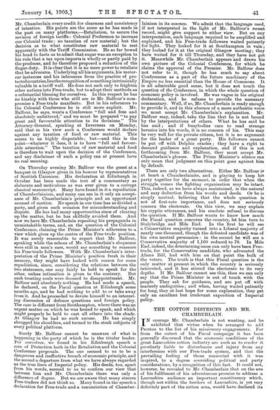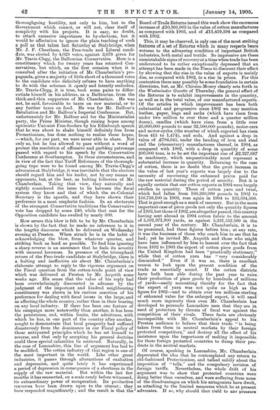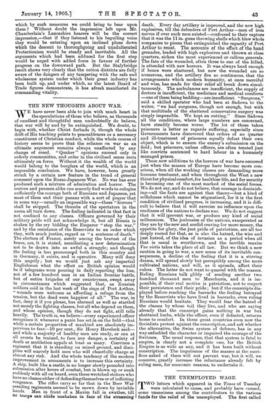T N courage Mr. Chamberlain is not wanting, and he exhibited
that virtue when he arranged to add Preston to the list of his missionary engagements. For from the outset of his Fiscal campaign it has been generally discerned that the economic conditions of the great Lancashire cotton industry are such as to render it peculiarly liable to disturbance and injury from any interference with our Free-trade system, and that the prevailing feeling of those connected with it was inspired, to a degree overriding political and party considerations, by a recognition of this fact. It could not, however, be revealed to Mr. Chamberlain that on the eve of his fulfilment of his adventurous promise to address a Lancashire audience an important constituency which, though not within the borders of Lancashire, is yet very definitely part of the cotton area, would have declared its thoroughgoing hostility, not only to him, but to the Government which cannot, or will not, clear itself of complicity with his projects. It is easy, no doubt, to attach excessive importance to by-elections, but it would be affectation to ignore the plain teaching of gush a poll as that taken last Saturday at Stalybridge, when Mr. J. F. Cheetham, the Free-trade and Liberal candi- date, was elected by 4,029 votes, against 3,078 given for Mr. Travis-Clegg, the Balfourian Conservative. Here is a constituency which for twenty years has returned Con- servatives, but which, on the first occasion when it is consulted after the initiation of Mr. Chamberlain's pro- paganda, gives a majority of little short of a thousand votes to the candidate who definitely refuses to have anything to do with the schemes it openly and latently embodies. Mr. Travis-Clegg, it is true, took some pains to differ- entiate himself in his address, as a Balfourian, from the thick-and-thin supporters of Mr. Chamberlain. He was not, he said, favourable to taxes on raw material, or to any further taxes on food. He was for Mr. Balfour's Retaliation and Mr. Balfour's Imperial Conference. But, unfortunately for Mr. Balfour and for the Ministerialist party, the Prime Minister, though raising hopes among optimistic Unionist Free-fooders by his Edinburgh speech that he was about to shake himself definitely free from Protectionism, has done nothing to realise those hopes, —which, for our part, we were never able to share. Not only so, but he has allowed to pass without a word of protest the resolution of offensive and garbling patronage passed with regard to his speech by the Conservative Conference at Southampton. In these circumstances, and in view of the fact that Tariff Reformers of the thorough- going type were to be found among Mr. Travis-Clegg's advocates at Stalybridge, it was inevitable that the electors should regard him and his leader, not by any means as opponents, but, at the best, as halting followers of Mr. Chamberlain. Taking that view, they naturally and rightly considered the issue to lie between the fiscal system they know and that of which the ex-Colonial Secretary is the apostle, and they have shown their preference in a most emphatic fashion. In an electorate Of the strongest Conservative traditions the Conservative vote has dropped by some 240, while that cast for the Opposition candidate has swelled by nearly 800.
How severe this blow is felt to be by Mr. Chamberlain is shown by the fact that he made no reference to it in the lengthy discourse which he delivered on Wednesday evening at Preston. When struck he is in the habit of acknowledging the blow, from whatever quarter, and striking back as hard as possible. To find him ignoring a sharp reverse is an assurance that he feels its severity with unusual keenness. In presence of the triumphant return of the Free-trade candidate at Stalybridge, there is a halting and ineffective air about Mr. Chamberlain's elaborate attempt to reply to the vigorous argument on the Fiscal question from the cotton-trade point of view which was delivered at Preston by Mr. Asquith some weeks ago. His sense that the value of his reply had been overwhelmingly discounted in advance by the judgment of the important and kindred neighbouring constituency was shown in his curious assertion of his preference for dealing with fiscal issues in the large, and as affecting the whole country, rather than in their bearing on any local industry. If there has been one feature of his campaign more noteworthy than another, it has been the persistence, and, within limits, the adroitness, with which he has, in one part of the country after another, sought to demonstrate that local prosperity had suffered disastrously from the dominance in our Fiscal policy of those antiquated principles which he has set himself to reverse, and that only by accepting his general doctrine could these special calamities be retrieved. Naturally, in the case of Lancashire, this line of argument has had to be modified. The cotton industry of that region is one of the most important in the world. Like other great industries, it passes through alternations of exaltation and depression, and quite lately it has experienced a period of depression in consequence of a shortness in the supply of the raw material. But within the last few months it has reasserted, on a scale rarely before witnessed, its extraordinary power of recuperation. Its productive resources have been drawn upon to the utmost ; they have responded magnificently ; and' the result is that the Board of Trade Returns issued this week show the enormous increase of £10,305,963 in the value of cotton manufactures as compared with 1903, and of £11,459,594 as compared with 1902.
This, it may be observed, is only one of the most striking features of a set of Returns which in many respects bears witness to the advancing condition of important British industries, both metal and textile. So impressive are these unmistakable signs of recovery at a time when trade has been understood to be rather exceptionally depressed that an attempt has been made in the Times to discount their effect by showing that the rise in the value of exports is mainly due, as compared with 1902, to a rise in prices. For this contention there may possibly be some foundation in certain directions, but, as Mr. Chiozza-Money clearly sets forth in the Westminster Gazette of Thursday, the general effect of the Returns is to exhibit improvements in the quantity, as well as in the total value, of our manufactured exports. Of the articles in which improvement has been both substantial and progressive since 1902 we may mention leather, paper, bags and sacks (which have risen from under two million to over three and a quarter million dozen), candles (which have risen from a little over 26,000,000 pounds to near 32,500,000 pounds), motor-cars and motor-cycles (the number of which exported has risen' from 415 to 1,474), and soda. And against a drop in value of £794,645, under the heading of iron and steel and the (elementary) manufactures thereof, in 1904, as compared with 1902, with a drop in quantity of some 200,000 tons, is to be set the important rise of £2,327,687 in machinery, which unquestionably must represent a substantial increase in quantity. Returning to the ease' of cotton, there is no doubt that the great increase in the value of last year's exports was largely due to the necessity of recovering the enhanced prices paid for the raw material during the period of scarcity. But it is equally certain that our cotton exports in 1904 were largely. swollen in quantity. Those of cotton yarn and twist, which had fallen from 166,360,900 pounds in 1902 to 150,758,100 in 1903, rose again in 1904 to 163,894,500. That is good enough as a mark of recovery. But in the more important case of piece goods not only the quantity figures of 1903, but those of 1902, are altogether passed, this country having sent abroad in 1904 cotton fabric to the amount of 5,591,971,900 yards, as against 5,331,552,500 in the second year of the century. Mr. Chamberlain, it is to be presumed, had these figures before him ; at any rate, it was the business of those who coach him to see that he. had; yet he invited Mr. Asquith and those who might.. have been influenced by him to lament over the fact that from 1892 to 1903 the export of cotton piece goods from the United Kingdom had been "practically stationary," while that of cotton yarn has " very considerably diminished." Even if it was so, there is excellent, reason to look upon the present condition of the trade as essentially sound. If the cotton districts , have both been able during the past year to raise , their production of piece goods by hundreds of millions of yards—easily accounting thereby for the fact that the export of yarn was not quite as high as the figure for 1902—and to obtain over ten millions sterling, of enhanced value for the enlarged export, it will need. much more ingenuity than even Mr. Chamberlain has developed to persuade Lancashire men that they are in need of protection by threats of fiscal war against the competition of their rivals. These facts are obviously incompatible with Mr. Chamberlain's appeal to his _ Preston audience to believe that their trade " is being taken from them in neutral markets by their foreign protected competitors," and destroy all the effect of his insistence upon the importance of making it impossible for those foreign protected countries to dump their pro- ducts in the neutral markets.
Of course, speaking in Lancashire, Mr. Chamberlain , deprecated the idea that he contemplated any return to old-fashioned Protectionism, and talked mildly about the 'imposition of " tolls,' and the compulsory revision of tforeign tariffs. Nevertheless, the whole drift of his argument was to show that protected countries were doing better than ourselves, and were suffering from none of the disadvantages on which his antagonists have dwelt, as attaching to the limited measures which he at present advocates. If so, why should they yield to any pressure which by such measures we could bring to bear upon them ? Without doubt the impression left upon Mr. Chamberlain's Lancashire hearers will be the correct impression,—that if they listened to his beguiling voice they would be entering upon an inclined plane down which the descent to thoroughgoing and unadulterated Protectionism would be steady and inevitable. All the arguments which had been adduced for the first step would be urged with added force in favour of further progress on the downward path. But the Stalybridge result shows very clearly that the cotton districts are fully aware of the dangers of any tampering with the safe and wholesome system under which their great industry has been built up, and under which, as the latest Board of Trade figures demonstrate, it has afresh manifested. its commanding vitality.








































 Previous page
Previous page